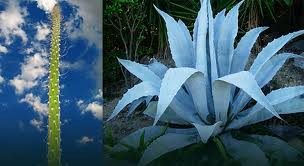
I got started on a series recently about agave nectar, and then had to put it down to attend to other business projects. Today I wanted to focus on an aspect of agave nectar that may be one of its most important nutritional contributions.
A disclaimer must be included before I continue. This information is only going to be helpful if the agave is consumed in conjunction with the guidelines as described in my earlier post. If your diet is high in sugar, it is NOT a license to simply switch to a different sweetener and use ad libitum.
Agave contains compounds known as fructans, which researchers in Mexico recently reported may help prevent osteoporosis by increasing intestinal calcium absorption. These same researchers, based at the National Polytechnic Institute, Guanajuato, Mexico, have suggested that these same fructans"may be beneficial in diabetes, obesity, stimulating the immune system of the body, decreasing levels of disease-causing bacteria in the intestine, relieving constipation, and reducing the risk of colon cancer".
Fructans do their job by functioning as"prebiotics"--they provide nutrition for the healthy bacteria in the colon.
These bacteria have been reported to change the way fat is absorbed, leading some researchers to suggest that agave may have some weight loss-enhancing qualities (again, when used according to the guidelines for upper limit of intake. A calorie is a calorie, regardless of where it comes from).
Fructans are simply long, non-digestible chains of fructose. It explains why the fructose content of agave nectar is so high. However, it appears to be in a different chemical form than that of simple fructose. If you're familiar with the differences between simple sugar, complex carbohydrate, and fiber…fructans, the way fructose is packaged in agave, is a soluble fiber. It's not digested or absorbed, and because it stays in the large intestine, it promotes the growth of beneficial, disease-fighting bacteria.
If you are still skeptical, and I don't blame you, given the plethora of conflicting information on the Internet, I would recommend measuring your own triglycerides before using any agave nectar. Then re-check those levels 3 months later to see if there is a difference.
It is important on this blog that we get it right…so if you take the challenge and you DO experience elevated triglycerides, I'd love to hear from you. That is important information to share.